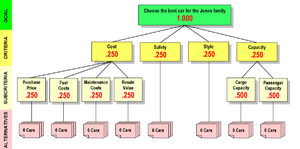Talk:Analytic Hierarchy Process
This article is under development as part of a specific academic project, and may therefore seem incomplete at times. For example, the references are presented in a temporarily brief form, important sections may be temporarily missing, etc. If you have something to add to the article, please discuss it here first. Louis F. Sander 07:58, 15 August 2007 (CDT)
- It's getting a lot closer to being a complete article, but still be patient, and still please discuss proposed changes here. (The references went from crap to dynamite, IMHO. Also the Wikipedia article is entirely crap, so here's a place where we're definitely ahead.) Louis F. Sander 00:01, 21 August 2007 (CDT)
The "See also" section needs to be vetted by an AHP expert. It's unclear how these subjects relate to AHP, especially as they are covered in online encyclopedias. Louis F. Sander 08:13, 7 September 2007 (CDT)
Pretty interesting
Pretty interesting stuff, Lou. Now if only some certain policy makers in our government would get a handle on some of it~ :-) —Stephen Ewen (Talk) 23:08, 7 October 2007 (CDT)
- It IS interesting, and the government uses it a lot, but only in scattered pockets. If this article goes as I think it will, it will be the first encyclopedic coverage of AHP anywhere. (And I've corresponded with several of the biggest experts in the field about this.) There doesn't seem to be one brief, authoritative exposition of the subject anywhere in the world. AHP is covered in a large number of books and papers, but it appears that nobody has ever gathered and summed up all the elementary stuff. There are a ton of sources, and the challenge is to find the good, understandable stuff in them and pull it all together in one place. I'm about 75% there at this point, or at least I think I am.
- My plan is to create an excellent article on CZ (where it's relatively free from meddlers), then move some of it to WP (where things are more widely covered by search engines, more good wikilinks are possible, etc.). The CZ article will always be better than the WP one, mainly due to CZ features like subpages, relative freedom from vandalism and editing by know-nothings, etc. If the article is as good as I think it will be, it will get a lot of attention from the AHP community. CZ could even use it as an example of the good, unique material over here, and of the advantages of CZ over WP.
- What got me started on it is that the WP article about AHP is really, really bad, and efforts to improve it have been thwarted by nitpicking amateurs, experts who aren't good encyclopedia editors, edit wars over trivia, etc. (not to mention the difficulty of writing a good article on a complicated subject). I know next to nothing about "approved" articles on CZ, but if this one could be approved before WP sees it, it might be a very good thing. Louis F. Sander 06:24, 8 October 2007 (CDT)
Notes copied from the article
Sorry, but it's not standard practice to have notes about the drafting of the article inline, in the article itself. I've moved them below. --Larry Sanger 19:13, 18 October 2007 (CDT)
Rewrite the lead when the rest of the article has been finished.
There is a lot of good material on this in the books. If it can be put here in a suitable way, this maybe should be the first section of the article, or at least somewhere way up at the top.
Maybe this should be "history and philosophy." At least there should be a little history somewhere.
Early on, we need to convey the meaning of priorities.
There is philosophical stuff here about A) psychology, and B) measurement.
There is underlying mathematical rigor.
Mind mapping could be a good way to construct a hierarchy. Tony Buzan. AHP is a method that breaks complexity into manageable pieces, works with each piece, then collectively evaluates all the pieces. The steps are...
Though the AHP can be used by an individual, our discussion will assume it's used by a group.
Brainstorming goes on a lot in the early stages.
We say "decision problem," but there might be a more general term.
Make it clear that this is a simplified description, and that it is based on previously published information, especially Decision Making for Leaders, but also including lots and lots of other books and articles.
Include a summary of the main steps in the process (the steps further described below).
Hello again, Lou....
Make judgments
Under Construction
Establish priorities for the elements of the hierarchy.
Includes inputting data.
Be careful about data. There are scales involved. Some are meaningful to us and the problem, some are not.
This includes the consistency check step (repeated at every level)
(Rozann: pairwise comparisons using judgment)
Derive priorities
Under Construction
This is done by "AHP Magic Math."
It turns your pairwise comparisons of items at one level into weights for the items at that level.
Maybe we are "developing" priorities, or "calculating" them, or ????
Synthesize priorities throughout the structure
Under Construction
More "AHP Magic Math"
It takes the priorities for the various items at the various levels and turns them into one big integrated set of priorities for the whole hierarchy.
Check sensitivity
Under Construction
Take a look at what would happen if your judgments changed.
- Article with Definition
- Developed Articles
- Advanced Articles
- Nonstub Articles
- Internal Articles
- Engineering Developed Articles
- Engineering Advanced Articles
- Engineering Nonstub Articles
- Engineering Internal Articles
- Mathematics Developed Articles
- Mathematics Advanced Articles
- Mathematics Nonstub Articles
- Mathematics Internal Articles
- Business Developed Articles
- Business Advanced Articles
- Business Nonstub Articles
- Business Internal Articles
- Engineering Underlinked Articles
- Underlinked Articles
- Mathematics Underlinked Articles
- Business Underlinked Articles
